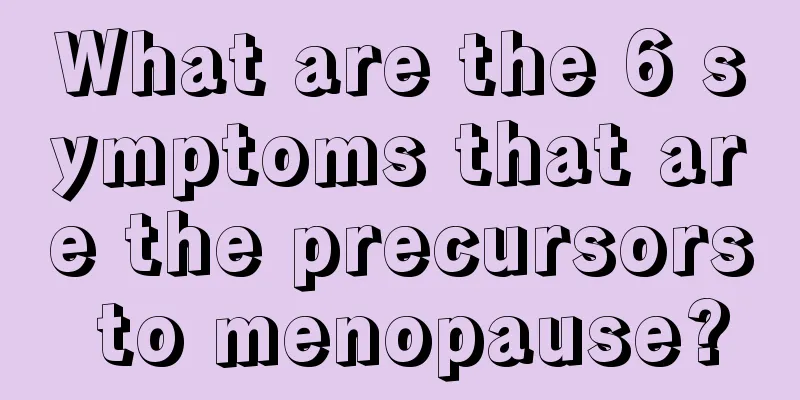What are the 6 symptoms that are the precursors to menopause?

|
In life, many women will gradually enter menopause when they are around 45 years old. This situation is very common, but women will experience significant changes in all aspects of their bodies when they enter menopause, so relevant conditioning measures need to be taken. When women regulate menopause, they usually do so based on the specific symptoms that appear, so the treatment measures are also different. So what are the 6 major symptoms that are the precursors to menopause? 1. Prone to illness Before menopause comes to you, your body functions begin to decline continuously, your protection level is lowered, and many diseases like to take advantage of the opportunity to invade. Therefore, women are particularly susceptible to cold at this time. Once they catch a cold, they will start to have nasal congestion and runny nose, and soon they will start to show signs of illness. 2. Drying The dryness mentioned here refers to many aspects. For example, the skin of the body, especially the face, becomes sensitive and dry. You are prone to dry mouth and tongue. Your hair becomes like dead branches. After these dry phenomena appear, you will soon enter menopause. 3. Bad mood Women who enter menopause often have bad or unpredictable moods. For example, you may suddenly become very impatient, always feel inexplicably irritable, or even prone to excessive anxiety. In addition, his temper becomes extremely bad, making people afraid to get close to him. 4. Hot flashes That is, it is easy to get hot and the body always feels hot. Especially at noon, cheeks are prone to redness. In addition, you will feel heat in your neck, chest and other parts, and even have the illusion of a heat wave. At the same time, it is particularly easy to sweat, making your body sticky. 5. Menstrual disorder The arrival of menopause will most likely have a great impact on your menstrual period. Once you suddenly experience amenorrhea or prolonged menstrual periods, or have irregular menstrual periods, you should be aware that menopause is approaching. The reason for saying this is that after menopause, the body's hormones will become unbalanced, and menstruation and hormones are closely related. Once the hormones are abnormal, the menstruation will be affected, leading to menstrual disorders. 6. Insomnia The reason why such annoying problems arise is mainly due to the decline in estrogen levels, which gradually disrupts the body's hormone levels and causes imbalances, causing many women to become irritable and often upset. The existence of these problems is the main culprit for women's insomnia. Some women suffer from insomnia in the first half of the night, but then they slowly fall asleep. But some women cannot sleep the whole night. Insomnia never leaves them. Most of these women feel listless and have red eyes the next day. |
<<: What are the signs of the first menstrual period after childbirth?
>>: What are the signs of menopause?
Recommend
What recipes can you eat during confinement?
Like the diet for pregnant women, the diet during...
Pregnancy, a lot of blood in the nose
During pregnancy, we need to pay special attentio...
How long does it take for menstruation to come after an abortion? What should you pay attention to after an abortion?
How long will it take for a woman to have her men...
Disadvantages of drinking burdock tea for women
Burdock tea is a pure natural health care product...
What's wrong with a lot of vaginal discharge?
Leucorrhea is quite important for women, because ...
Will a grade 3 placenta at 37 weeks come early?
We all know that embryos are generally divided in...
How did the Leshan Giant Buddha come about? How tall is the Leshan Giant Buddha?
The Leshan Giant Buddha is located at the conflue...
Please! Stop using this kind of paper to wipe your mouth
At the beginning of today's article, I would ...
Uterine artery ligation in women
Now, due to the implementation of family planning...
What to do if the vaginal discharge is red
As we all know, leucorrhea is the "barometer...
The difference between cervical biopsy and TCT
Many female friends suspect that they have gyneco...
Precautions before cesarean section
When giving birth, women can choose not only natu...
The best time to enlarge breasts after weaning
After the baby is 2 years old, the mother will we...
How to use pregnancy test stick correctly
Nowadays, there are many ways to self-check wheth...
What is the disease of breast lumps? What should I do if I suffer from breast fibroids?
When a lump as big as a pigeon egg appears on the...









